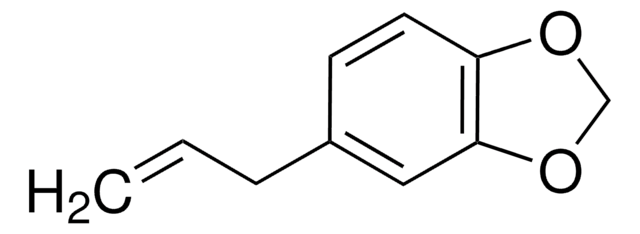W247502
Eugenol methyl ether
≥98%, FCC
Sinónimos:
Eugenol methyl ether, 4-Allyl-1,2-dimethoxybenzene, Eugenyl methyl ether
About This Item
Halal
Kosher
Productos recomendados
biological source
synthetic
Quality Level
grade
Fragrance grade
Halal
Kosher
agency
follows IFRA guidelines
reg. compliance
EU Regulation 1223/2009
FCC
assay
≥98%
refractive index
n20/D 1.534 (lit.)
bp
254-255 °C (lit.)
mp
−4 °C (lit.)
density
1.036 g/mL at 25 °C (lit.)
application(s)
flavors and fragrances
documentation
see Safety & Documentation for available documents
food allergen
no known allergens
fragrance allergen
eugenol
organoleptic
cinnamon; clove; spicy; sweet; warm
SMILES string
COc1ccc(CC=C)cc1OC
InChI
1S/C11H14O2/c1-4-5-9-6-7-10(12-2)11(8-9)13-3/h4,6-8H,1,5H2,2-3H3
InChI key
ZYEMGPIYFIJGTP-UHFFFAOYSA-N
¿Está buscando productos similares? Visita Guía de comparación de productos
Categorías relacionadas
General description
Application
- Development of broad-spectrum immunoassay with monoclonal antibody to detect five eugenols and study of their molecular recognition mechanism.: This article presents a new immunoassay using a monoclonal antibody designed to detect multiple eugenol derivatives including methyl eugenol, offering insights into their molecular interactions and potential applications in food safety and pharmaceutical analysis (Luo et al., 2024).
Biochem/physiol Actions
Other Notes
Disclaimer
signalword
Warning
hcodes
Hazard Classifications
Acute Tox. 4 Oral - Aquatic Chronic 2 - Carc. 2 - Muta. 2
Storage Class
10 - Combustible liquids
wgk_germany
WGK 1
flash_point_f
230.0 °F - closed cup
flash_point_c
110 °C - closed cup
ppe
Eyeshields, Faceshields, Gloves, type ABEK (EN14387) respirator filter
Elija entre una de las versiones más recientes:
¿Ya tiene este producto?
Encuentre la documentación para los productos que ha comprado recientemente en la Biblioteca de documentos.
Los clientes también vieron
Nuestro equipo de científicos tiene experiencia en todas las áreas de investigación: Ciencias de la vida, Ciencia de los materiales, Síntesis química, Cromatografía, Analítica y muchas otras.
Póngase en contacto con el Servicio técnico











